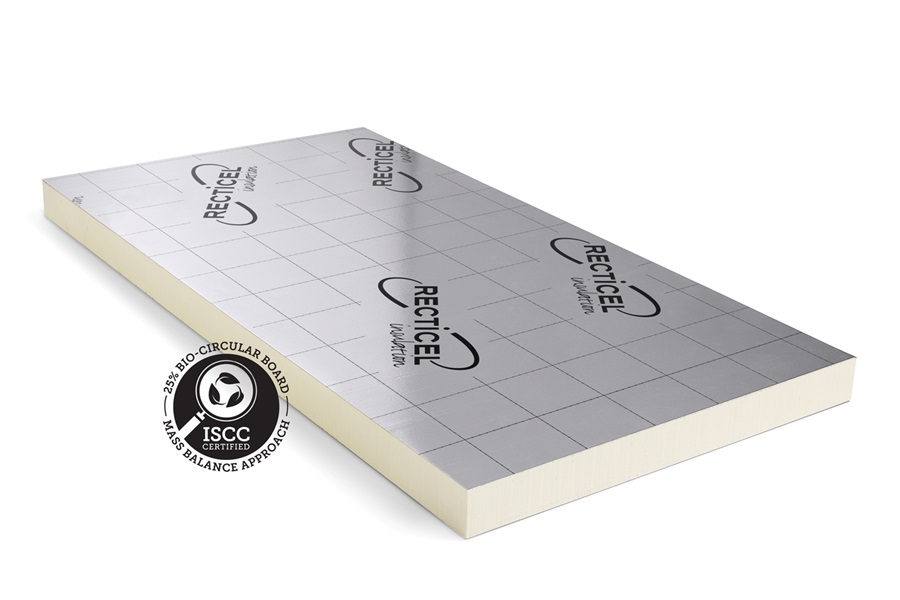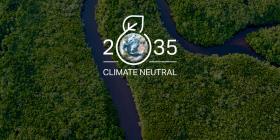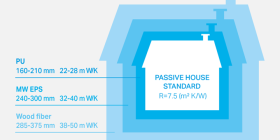
More sustainable PU insulation with Desmodur® CQ MS
Recticel Insulation is a Belgium-based provider of thermal and acoustic insulation. The firm is well-known for high-performance polyurethane (PU) insulation boards for pitched and flat roofs, floors, external walls and internal wall cavities. Their products are sold through the construction trade, insulation dealers and DIY retailers around Europe.
Customers expect insulation boards to deliver interior comfort and increase energy efficiency in everyday use, cutting operating costs and lessening climate impact. Now, as buildings achieve higher operating efficiency thanks to better insulation, a larger proportion of any building’s life cycle emissions comes from the raw materials, required to produce the insulation materials. Taking this wider life cycle view of environmental impact is vital in the construction industry, which generates a significant slice of global CO2 emissions.
So when Recticel decided to launch a new range of more sustainable polyurethane foam insulation boards, the task was to find a material solution that would generate much lower emissions during production, yet deliver the high insulation performance that makes PU so attractive as a material in the first place. The new Recticel Impact range is also part of the company’s wider drive to achieve net zero emissions by 2050.

The technical challenge here was to reduce the CO2 emissions generated in the production of Recticel Impact insulation, but without losing any of the performance of fossil-based PU boards, which insulate and can cut a building’s heating and cooling needs by up to 70%.
Manufacturers of polyurethane insulation face a particular challenge here: how to make MDI (methylenediphenyl diisocyanate), a vital chemical feedstock in polyurethane, more sustainable. Alternative raw materials like bio-based oils or organic waste can in fact be incorporated into MDI feedstock. The issue is how to account for their share in a unified chemical process that shares many other inputs.
Mass balance offers a methodology for tracking bio-based and recycling-derived feedstocks when they are mixed into a continuous stream process. Using this calculation method after the chemical transformations are completed, the renewable share can be allocated to specific end products. This accepted accounting mechanism is known as the mass balance approach.
Mass balance certification from the ISCC (International Sustainability and Carbon Certification) is what enables chemical feedstock providers like Covestro to label specific products as renewable. When a customer wants to be entitled of the ISCC PLUS certification label, he needs to be self-certified. This is the key to our climate neutral2 MDI: Desmodur® CQ MS and Recticel Impact insulation.
We were able to help Recticel Insulation reduce the CO₂ emissions embodied in a new line of rigid PU insulation boards by 43% - with no tradeoff in quality. Our climate neutral² Desmodur® CQ MS paved the way for this achievement, and we can help other producers to improve their sustainability targets.
Our Desmodur® CQ MS was the key to producing the more sustainable Recticel Impact range of PU insulation boards. By replacing a significant share of the fossil-based precursor MDI with our climate neutral2 Desmodur® CQ MS feedstock, Recticel reduced its CO2 emissions1 across the new range by an average of 43% compared to the previous product line. Yet the technical performance, including durability and lambda values, remains identical to fossil-based products.
Renewable bio waste is allocated to climate neutral2 Desmodur® CQ MS via mass balance methodology, and several Covestro sites around the world carry ISCC PLUS certification. This indicates that our suppliers' use of biomass waste and residues has been verified and all chemical transformations are properly accounted for. The CQ suffix on this grade denotes both “circular intelligence” and attributed share of alternative raw materials over 25%.
Other PU insulation producers can also reduce their CO2 emissions with Desmodur® CQ MS, without any tradeoff in durability or thermal performance. The convenient drop-in solution requires no modifications to processing facilities and demands no slow-down in production. Get in touch with us for this and other sustainable solutions that are available for supply chain partners today.
1Emissions reduction based on internal LCA calculations stages A1-A3 (cradle-to-gate) according to the EN15804+A2 standard using a mass balance approach.
2 Climate neutrality is the result of an internal assessment of a partial product life cycle from raw material extraction (cradle) to the factory gate (of Covestro), also known as cradle-to-gate assessment. The methodology of our LCA with external audit and certification is based on the ISO 14040 and 14044 standards. The calculation takes into account biogenic carbon sequestration based on preliminary data from the supply chain. No compensation measures were applied.
Our new Recticel Impact range of polyurethane insulation boards offers a CO₂ footprint on average 43% lower than previous products, while durability, thickness and thermal performance are all unchanged. Desmodur® CQ MS from Covestro enabled us to make this huge step forward in our sustainability strategy.
Key benefits
- Climate neutral: Desmodur® CQ MS has net zero CO₂ emissions from cradle to gate.
- Fast: This renewable feedstock is an easy, quick replacement solution.
- Renewable: This grade has more than a 60% sustainable share using a mass balance approach.
- Seamless: Proven processes, formulations and equipment can be left unchanged.
- High-performance: Durability and thermal performance are identical to fossil-based PU insulation.








.jpg?h=297&w=594&rev=ee8e09106bd14140b4f8ca39945b151e&hash=9D43F4A5BCF50BCE37ACB3CB5EAF07D9&usecustomfunctions=1¢ercrop=1)






